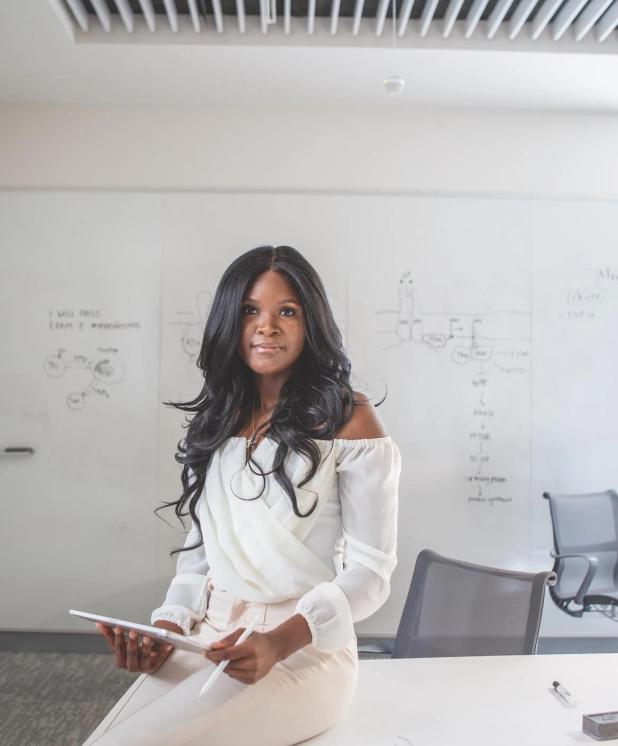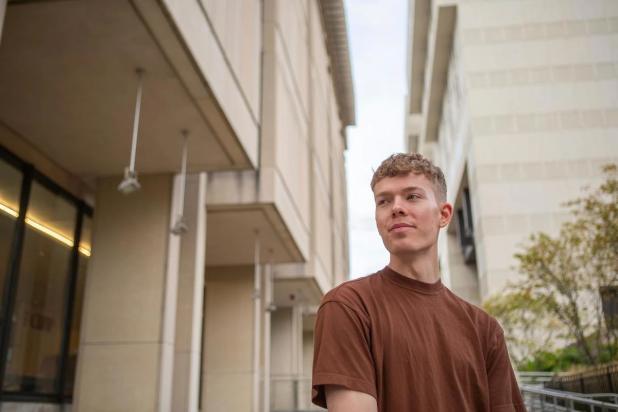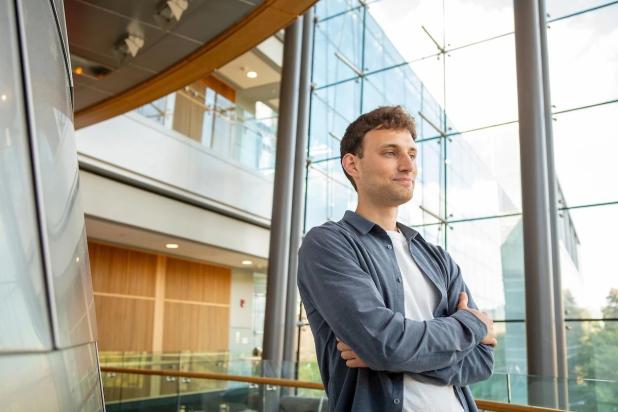
Harvard Medical School classroom.
Credit: Protocol Snow
Three MD students — Gerry Serwald, Sam Steuart, and Zade Akras, an HST MD student — discuss the paths that propelled them into leadership roles
Molly McDonough | Harvard Medicine

Geraldine (Gerry) Serwald
Gerry Serwald understands the importance of leading by example. When she was an undergraduate at Washington University in St. Louis, she’d toyed with the idea of pursuing premed — but it wasn’t until she attended a meeting of the Minority Association of Pre-Medical Students that those plans solidified. During that meeting a photo of Ebony Carter, a Black OB-GYN, appeared on screen during a presentation.
“I got goosebumps. I had never seen a Black female physician before,” says Serwald. “You know what they say about ‘If you can see it, you can be it and achieve it’? It is so true.”
Serwald’s parents, who emigrated from Ghana to Chicago before she was born, also believed she could do whatever she set her mind to. Their confidence rubbed off on her. Growing up, she became increasingly aware of how significant their encouragement was in a society that often failed to instill confidence in women. “I decided I want to bring that empowerment to the societal level for marginalized communities, harnessing medicine as a tool for self-agency, empowerment, and social justice,” Serwald says.
After college she spent a few years working in a maternal-fetal medicine research group at St. Louis’s Barnes-Jewish Hospital. There she witnessed the interdisciplinary aspects of medicine, connected directly with labor and delivery patients — and affirmed her desire to apply to medical school. She chose HMS because of the “robust resources and incredibly inspiring people. HMS has the best network for any path I pursue.” Once she arrived, she was also “enamored with and in awe of” her richly diverse community of classmates.
The desire to build that community drew Serwald to the HMS and HSDM Student Council. In September of her first year, she was elected president of her class. “Medicine is extraordinary. But it will inevitably be challenging. I wanted to make sure we built a strong community, so that when times do get tough, we can comfort and support each other,” she says.
During her tenure as president, Serwald has emphasized “follower-based leadership,” giving her fellow council members the agency, encouragement, and autonomy to thrive. She’s proud of how they have brought their own skills and ideas to planning successful community-building events and to establishing a longitudinal relationship with the School's Office for Community Centered Medical Education to work with local organizations serving the people of Boston.
As her second year of medical school gets underway, Serwald is busy starting rotations and is excited to experience the different specialties. Regardless of what she decides to pursue, she knows that female and women’s health will always be paramount in her practice. And she’ll continue as president of her class, with a leadership outlook that hearkens back to her upbringing. “The beauty of community-building is that it allows us to learn from and leverage our multifaceted perspectives,” she says. “With a supportive community as our home base, we’re all empowered to pursue our interests and effect positive change within the HMS community and beyond.”

Sam Steuart
When he arrived in Boston, Sam Steuart was stuck by how different the city’s health care scene looked compared to that of Topeka, Kansas, his hometown. Kansas has not expanded Medicaid and most of its counties are considered medically underserved. “In Kansas I experienced and witnessed people in my community, people I love, not being able to access the care we all need,” Steuart says. “Our stories compelled me try to do something about that.”
That drive to expand health care access shaped Steuart’s path to medical school. As an undergraduate at University of Kansas, he was the executive director of a nonprofit organization that oversaw twelve volunteer programs, and he served in his state’s health department to expand the implementation of school-based health centers across Kansas.
Following graduation, he headed to the United Kingdom on a Marshall Scholarship to pursue a master’s in public health at the London School of Hygiene & Tropical Medicine and a master’s in immunology at Oxford University. During this time, he also served as a senior consultant for the World Health Organization. His path to pursuing a medical degree at HMS ties it all together, providing him with the tools to directly deliver the health care and expand its access to all people.
The rising second-year student is still deciding what to specialize in. “Everything we learn I love,” Steuart enthuses, noting that HMS is his vessel to explore medicine — he’s the first in his family to become a physician. “I love the infectious energy of our professors.” Whatever he chooses, Steuart’s goal is to integrate policy and medicine while advocating for a single-payer health care system. That goal could be realized through service at a federal agency such as the Department of Health and Human Services, while maintaining a clinical practice. “I intend to be one of those people who wears a lot of hats,” he adds.
That’s not surprising, as Steuart already does. He was elected as the HMS and HSDM Student Council’s first-ever vice president of community health and action — a role that focuses on strengthening ties between students and local communities. He’s been working to identify community partners, understand their needs, and figure out how medical students can support their work. “There’s no better time than now to start,” he says. “As med students, everyone says we’re busy. But we’re not too busy to do the meaningful work in communities that we should be doing.”
That enthusiasm and community-mindedness characterizes Steuart’s entire outlook on medicine. “Every part about being a physician is political and social, and it matters to be deeply integrated into the community,” he says. “There’s no such thing as being a physician without being an advocate.”

Zade Akras
Growing up in Cleveland, Ohio, Zade Akras was drawn to exploring how the world works at its most fundamental level. That’s why math fascinated him. “With math, you can build robust theories from the ground up,” he says. “You can use nothing but logic and reasoning to develop theories that have applications across all fields.”
Akras was also influenced by his parents, who emigrated from Syria to the United States shortly before he was born. Both work in medicine; Akras’s father is a surgeon and his mother an architect who designs hospitals. After earning an undergraduate degree in math at Yale, Akras decided to go to medical school. “I wanted to try and leverage my skillset in a way that had a more direct effect on people’s lives,” he said.
A focus on quantitative science offered through the Harvard-MIT Program in Health Sciences and Technology (HST) drew Akras to HMS. The opportunity to combine research with coursework at Harvard and MIT was “really too hard to pass up,” says Akras, listing some recent perks: lectures from one of the world’s leading quantitative physiologists in his cardiology class and working alongside the researchers at the forefront of using machine learning in health care.
Since arriving on campus, Akras says, one benefit has stood out. “The biggest draw since I’ve gotten here has been my classmates,” he says. “They’ve had all types of experiences before coming to medical school, and I’ve learned so much from them. They’ve shaped my outlook on medicine.” To foster those connections and to stay in touch with friends in the Pathways program, Akras pursued a role representing HST as vice president of student services and programming in the HMS and HSDM Student Council. Now, he works alongside Ashish Dahal, his Pathways counterpart on the council, to organize events like social mixers, formals, and other activities.
Akras is also working in the Broad Institute lab of geneticist Benjamin Neale, an HMS associate professor of medicine at Massachusetts General Hospital, developing statistical methods for single-cell genetic studies. It’s an ideal setting for the aspiring physician-scientist — he can hone math and statistics skills alongside a group of like-minded researchers and to prepare for a career pursuing either genetics or biostatistics and data analysis.
While his role in medicine will likely look different from those of his parents, Akras carries valuable lessons they imparted. Now spending more time in hospitals, for example, he notices the details his mother considered when she was designing patient rooms, hallways, or reception areas. “Giving the patient the best experience possible starts well before they meet the physician, which I learned from my mother,” Akras says. “There’s so much more to patient care than what the doctor does in that one visit.”
Molly McDonough is the associate editor of Harvard Medicine magazine.
Images: John Soares
* Originally published in Harvard Medicine